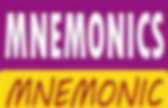

Mnemonic. Knuckle mnemonic for the number of days in each month of the Gregorian Calendar. Each protruding knuckle represents a 31-day month. A mnemonic (RpE: /nəˈmɒnɨk/,[1] AmE: /nɛˈmɑːnɪk/ the first "m" is silent), or mnemonic device, is any learning technique that aids information retention. Mnemonics aim to translate information into a form that the brain can retain better than its original form. Even the process of merely learning this conversion might already aid in the transfer of information to long-term memory. Commonly encountered mnemonics are often used for lists and in auditory form, such as short poems, acronyms, or memorable phrases, but mnemonics can also be used for other types of information and in visual or kinesthetic forms. Their use is based on the observation that the human mind more easily remembers spatial, personal, surprising, physical, sexual, humorous, or otherwise 'relatable' information, rather than more abstract or impersonal forms of information.
History[edit] List of mnemonics. This article contains lists of some common mnemonics. Art[edit] To remember the Elements of Art: Space, Form, Texture, Shape, Line, Value, Color. Spaceships Fly Through Space Looking Very CoolThe Fat Cat Sings Songs Very Loudly Astronomy[edit] My Very Easy Memory Jingle Seems Useful Naming Planets My Very Educated Mother Just Served Us Nachos Many Very Educated Men Justify Stealing Unique Ninth obsolete: My Very Earnest Mother Just Showed Us Nine Planets My Very Easy Method Just Speeds Up Naming Planets[1] My Very Educated Mother Just Served Us Nine Pies Mary Visits Every Monday Just Stays Until Noon Period My Very Educated Mother Just Said Uh-oh!
In Have Spacesuit Will Travel, Robert A. Biology[edit] Business and Economics[edit] To remember the American Institute of Certified Public Accountants (AICPA) "Principles of Professional Conduct" from the "Code of Professional Conduct" (Responsibility, The Public Interest, Integrity, Objectivity and Independence, Due Care, Scope and Nature of Services):
☢️ ABCDE. ☢️ ACED IT. ☢️ ADVOKATE. ☢️ ACECARD. ☢️ CLEAR. ☢️ COW. ☢️ COME ALIVE. ☢️ CHAP. ☢️ ENAMEL. ☢️ EEECA. ☢️ DASH. ☢️ DIE. ☢️ DECIDE. ☢️ DOMESTIC ABUSE. ☢️ FOCUS. ☢️ GOWISELY. ☢️ GROWTH. ☢️ GROW. ☢️ GUN. ☢️ HWWWWW. ☢️ HAVES. ☢️ IIMARCH. ☢️ ID COP PLAN. ☢️ JAR. ☢️ JOG. ☢️ KISS. ☢️ MPDSHAGCATTLE. ☢️ MAP. ☢️ MICE. ☢️ METHANE. ☢️ NO ELBOWS. ☢️ OATS. ☢️ OARS. ☢️ OCEAN. ☢️ OSCAR. ☢️ PICO. ☢️ PAW. ☢️ PEACE. ☢️ PECK. ☢️ PEST. ☢️ PLAN. ☢️ PDCA. ☢️ PIPES. ☢️ PEPSI. ☢️ POSH. ☢️ PC PLUS. ☢️ PERFUME. ☢️ SCORCH. ☢️ SIR OF HALO. ☢️ SMART. ☢️ STAR. ☢️ SHACKS. ☢️ SPECSS. ☢️ SADCHALET. ☢️ SAOP. ☢️ STAIRS. ☢️ STOP IT. ☢️ SCONES. ☢️ SACRED. ☢️ SAFECHORM. ☢️ STUDIO. ☢️ SAFEGUARD. ☢️ RONS. ☢️ RARA. ☢️ TIIP. ☢️ TIM PADEPIPER. ☢️ VAK. ☢️ VAST POLAR LAW. ☢️ WIFE. ☢️ WILTSPAR. ☢️ WITNESS AT COURT. ☢️ 5 Whys. ☢️ 5S. ☢️ 4Ps.